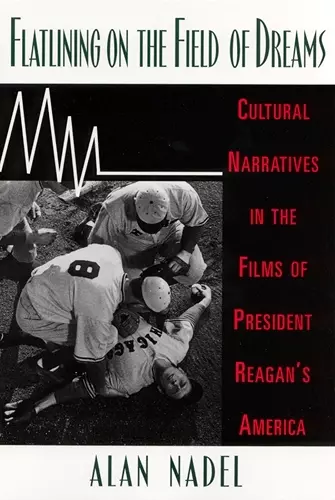Flatlining on the Field of Dreams
Cultural Narratives in the Films of President Reagan's America
Format:Paperback
Publisher:Rutgers University Press
Published:1st Jun '97
Currently unavailable, and unfortunately no date known when it will be back

"Flatlining on the Field of Dreams takes a apart some of the most commercially successful films of the epoch, demonstrating how they reflected, debated, and played with the dominant ideology of the time. . . . cleverly and wittily written . . . . The book will work extremely well in the classroom."
-Film Quarterly
"From Back to the Future to Forrest Gump, Nadel shows not only how notions of cinematic time re-script political change but how our very conceptualizations of change are thematized by our experiences of watching movies. This is not simply film history, or film as history, but film affirming "history" in the same way that Ronald Reagan affirmed film narratives."
-Susan Jeffords, University of Washington
"Flatlining on the Field of Dreams brilliantly restages the cultural narratives associated with Reaganism within a neo-imperialist cinematic space and reveals the heretofore unexamined role class played in the reproduction of those narratives."
-Donald E. Pease, Dartmouth College
Flatlining on the Field of Dreams demonstrates, with witty prose and careful analysis, how the overindulgent, image-conscious years of the Reagan administration are reflected in sundry aspects of American films produced during that era. Discussing dozens of films, including Home Alone, Beetlejuice, Ghost, The Little Mermaid, Working Girl, Who Framed Roger Rabbit?, and Trading Places, Alan Nadel identifies narratives about credit, deregulation, gender, race, and masculinity that defined "President Reagan's America." Linking the way Hollywood films work to the stories they tell, he explains how the ideas and values of Reaganism became the symbolic food of a hyper-consumptive society. The book provides hard-to-ignore demonstrations of the extensive synergy between politics, history, and popular culture.
"Flatlining on the Field of Dreams takes a apart some of the most commercially successful films of the epoch, demonstrating how they reflected, debated, and played with the dominant ideology of the time. . . . cleverly and wittily written . . . . The book will work extremely well in the classroom." * Film Quarterly *
"From Back to the Future to Forrest Gump, Nadel shows not only how notions of cinematic time re-script political change but how our very conceptualizations of change are thematized by our experiences of watching movies. This is not simply film history, or film as history, but film affirming history in the same way that Ronald Reagan affirmed film narratives." -- Susan Jeffords * University of Washington *
"Flatlining on the Field of Dreams brilliantly restages the cultural narratives associated with Reaganism within a neo-imperialist cinematic space and reveals the heretofore unexamined role class played in the reproduction of those narratives." -- Donald E. Pease * Dartmouth College *
"Flatlining on the Field of Dreams takes a apart some of the most commercially successful films of the epoch, demonstrating how they reflected, debated, and played with the dominant ideology of the time. . . . cleverly and wittily written . . . . The book will work extremely well in the classroom." * Film Quarterly *
"From Back to the Future to Forrest Gump, Nadel shows not only how notions of cinematic time re-script political change but how our very conceptualizations of change are thematized by our experiences of watching movies. This is not simply film history, or film as history, but film affirming history in the same way that Ronald Reagan affirmed film narratives." -- Susan Jeffords * University of Washington *
"Flatlining on the Field of Dreams brilliantly restages the cultural narratives associated with Reaganism within a neo-imperialist cinematic space and reveals the heretofore unexamined role class played in the reproduction of those narratives." -- Donald E. Pease * Dartmouth College *
ISBN: 9780813524405
Dimensions: 229mm x 152mm x 15mm
Weight: 369g
256 pages